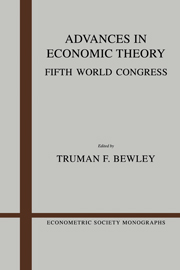Book contents
- Frontmatter
- 1 Auction theory
- 2 Game-theoretic analyses of trading processes
- 3 The theory of contracts
- 4 Battles for market share: incomplete information, aggressive strategic pricing, and competitive dynamics
- 5 A sequential strategic theory of bargaining
- 6 On the complexity of linear programming
- 7 Laboratory experimentation in economics
- 8 Increasing returns and the theory of international trade
- 9 Strategic aspects of trade policy
- 10 Equilibrium without an auctioneer
- 11 Arrow-Debreu programs as microfoundations of macroeconomics
9 - Strategic aspects of trade policy
Published online by Cambridge University Press: 05 January 2013
- Frontmatter
- 1 Auction theory
- 2 Game-theoretic analyses of trading processes
- 3 The theory of contracts
- 4 Battles for market share: incomplete information, aggressive strategic pricing, and competitive dynamics
- 5 A sequential strategic theory of bargaining
- 6 On the complexity of linear programming
- 7 Laboratory experimentation in economics
- 8 Increasing returns and the theory of international trade
- 9 Strategic aspects of trade policy
- 10 Equilibrium without an auctioneer
- 11 Arrow-Debreu programs as microfoundations of macroeconomics
Summary
Introduction
To most non-economists, and to some economists, the word “strategic” in the title will have either military connotations (securing our supplies of essential materials, denying such materials or sensitive technology to our adversaries) or industrial policy connotations (identification and promotion of sectors that are of special importance to our economy). The role of trade policy in such situations is indeed an interesting question; for recent analyses see Cooper (1987, pp. 305-15) and Krugman (1987), respectively.
However, it has become customary in international trade theory to use the word “strategic” in a different sense - namely, that of game theory. In the working of trade and trade policy, there is the usual structural interaction among the firms and governments: The outcome for each depends on the actions of all. The added element of strategic interaction arises when each decision maker is aware that he faces an environment that is not passive, but composed of other rational decision makers, who in turn are similarly aware, and so forth.
One expects such strategic interactions to arise when there is a small number of large buyers, sellers, or policy makers. During the last four decades, such conditions have arisen due to the growth of large and multinational firms, of public enterprises in major industries, and of large countries and blocks with considerable economic power. Until recently, trade theory neglected these developments. The standard model assumed perfect competition among firms, and allowed only one government to be active in policy making.
- Type
- Chapter
- Information
- Advances in Economic TheoryFifth World Congress, pp. 329 - 362Publisher: Cambridge University PressPrint publication year: 1987
- 84
- Cited by



